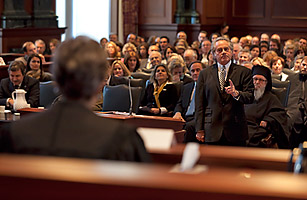
Socrates, the famed Greek philosopher, made a rare public appearance on May 12, in the Ceremonial Courtroom of Manhattan’s Federal Courthouse. In fact, he took the corporeal form of famed defense attorney Benjamin Brafman, currently representing embattled IMF chief Dominique Strauss-Kahn, who was highly animated in his defense against the millennia-old impiety and corruption charges levied against the Athenian. Fortunately, there was not a toga to be seen in the audience.
The court was in session on a brisk spring evening to reargue the case against Socrates, sentenced to death in 399 B.C. after a jury of 500 of his peers convicted him of failing to honor the city’s gods and abetting in the corruption of Athens’ youth. The accusation, submitted by Meletus and two other Athenians, claimed that Socrates held other Gods before those of the city of Athens, and by spreading his dissenting views in the agora, he was encouraging the youth to rebel against the city. But the charges against the philosopher strike a deeper chord, according to Dr. Alexander Nehamas, a Princeton University professor and Greek scholar. “Was it his politics? His arrogant ways? His rationalist ethics?” he asks. It’s no surprise that the sentence handed down by the Athenian court 2,410 years ago has come under scrutiny from these scholars, who cite the narrow margin by which Socrates was sentenced to death, 280 to 220, as a marker of the jurors’ uncertainty.
So the case went back to trial, to be heard by three steely New York judges who would evaluate the evidence with a modern perspective, at a hearing that fused historical discussion with sometimes comical theatrics. Yet no one knew how the proceedings would unfold — after all, how easy can it be to rehash a trial with only circumstantial evidence, produced decades after the fact by Socrates’ admirers Plato and Xenophon? Would Socrates be sentenced to death again or would he be acquitted, albeit a few millennia too late?
5:26 p.m. “I plan on being a little bit over the top,” announces Colonel Matthew Bogdanos, part of the prosecution team. The Assistant District Attorney of Manhattan — who joined a counterterrorism operation in Afghanistan after 9/11 and later served three tours in Iraq — is a force to be reckoned with.
5:33 p.m.
“Welcome to Athens!” Chief Judge Dennis Jacobs proclaims. He explains the charges against Socrates from a legal perspective. In ancient Athens, turns out there’s no presumption of innocence.
5:43 p.m.
Anthony Papadimitriou heads off the case for the prosecution. He’s Greek. And his accent is really Greek. It adds a new level of credibility to his testimony.